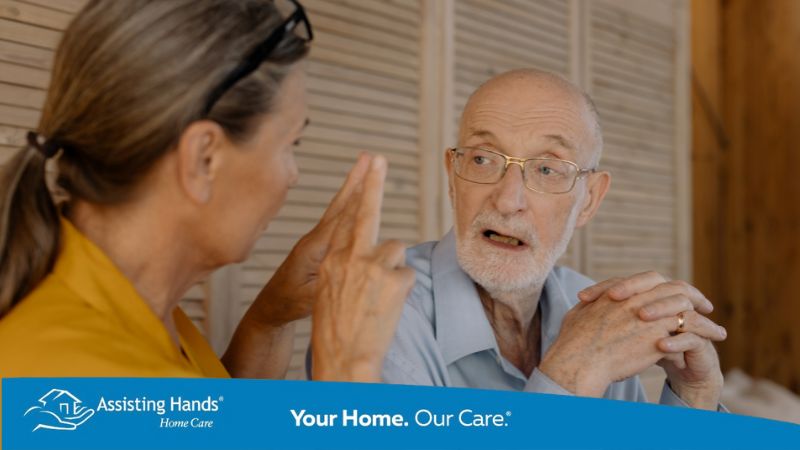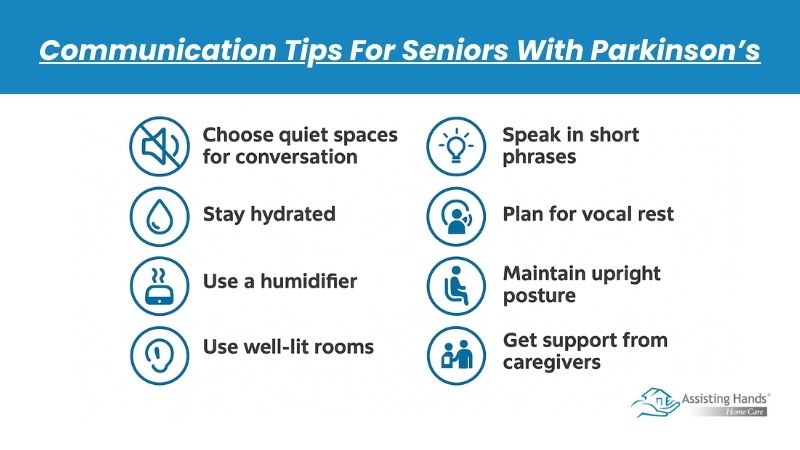
How Parkinson’s Disease Affects Speech and Communication in Seniors
One of the early signs of Parkinson’s disease is a change in voice and speech. Seniors may speak more softly than usual, adopt a monotone voice, or slur their words. Cognitive changes linked to the disease can also make it difficult to find the right words or start sentences.
Over time, most elderly people living with Parkinson’s will experience speech difficulties due to how the disease affects muscles and nerves involved in speaking. This includes muscles in the larynx, throat, respiratory system, as well as the tongue, lips, and roof of the mouth.
Common Speech Symptoms Experienced by Seniors with Parkinson’s
Speech difficulties are often among the earliest signs of Parkinson’s disease in seniors. These symptoms may begin subtly and progress gradually, making them easy to overlook in the early stages. However, recognizing these changes early can help families seek appropriate treatment—like speech therapy—and make adjustments to support better communication.
Here are some of the most common early speech-related symptoms in elderly individuals with Parkinson’s:
- Reduced facial expressions (facial masking): Seniors may show less emotion in their face, making it difficult for others to read their mood or intentions during conversation.
- Soft or muffled voice: The person may begin speaking more quietly than usual, often without realizing it, making it harder for others to hear them.
- Monotone speech: Their voice may lose its natural variation in pitch and emotion, sounding flat or robotic.
- Mumbling or slurred speech: Clarity may decrease as mouth and tongue muscles become affected, causing words to sound jumbled or incomplete.
- Hoarseness or strained voice: Seniors may sound raspy or rough, especially after extended talking.
- Breathiness: Speaking may require more effort, and their voice may have a breathy or weak quality due to impaired respiratory muscles.
- Trailing off at the end of sentences: Seniors may start sentences strongly but taper off toward the end, making it difficult to complete thoughts clearly.
- Voice tremors: Slight shakiness or tremor in the voice can occur, often making speech inconsistent or harder to understand.
- Fatigue during speech: Seniors may tire quickly when speaking, limiting their ability to participate in conversations or phone calls.
These early symptoms can lead to misunderstandings, social withdrawal, and frustration for both the senior and those around them. Left unaddressed, these changes can affect quality of life and emotional well-being. Fortunately, speech therapy and supportive home care can make a significant difference in helping seniors maintain their voice and confidence in daily communication.
What treatments are available for speech issues caused by Parkinson’s?
Speech issues caused by Parkinson’s disease are treatable with speech therapy. Some speech-language pathologists are trained to specifically help amplify the voice of older adults with Parkinson’s disease. They utilize a form of treatment called the Lee Silverman Voice Treatment.
This helps the elderly maintain their communication skills. The senior learns how to conserve energy by relying on nonverbal communication. A speech therapist also introduces the Parkinson’s patient to assistive devices, like personal microphones, touchpads, and gadgets, that signal to the senior to speak up if their volume decreases.
Communication Tips for Seniors with Parkinson’s Disease
Older adults with Parkinson’s disease who experience speech difficulties can take simple steps at home to improve their communication and reduce fatigue during conversations. Here are some helpful tips:
- Choose quiet spaces for conversation: Turn off the television, radio, or other background noise to focus on clear speech.
- Stay hydrated: Drink plenty of water throughout the day to keep the throat moist and prevent vocal strain.
- Use a humidifier: Run a humidifier if the home has dry air, especially in colder months, to keep the throat comfortable.
- Ensure the listener can see your face: Sit or stand where your conversation partner has a clear view of your mouth and facial expressions.
- Use well-lit rooms: Good lighting improves communication by making facial cues and lip movements easier to see.
- Speak in short phrases: If you tire quickly, use one or two syllables per breath to conserve energy while speaking.
- Plan for vocal rest: Take breaks during conversations—especially on phone calls—to avoid voice fatigue.
- Maintain upright posture: Sit or stand straight to allow proper airflow from the lungs to the vocal cords.
- Use a voice amplifier if needed: Seniors with naturally soft voices can benefit from personal amplifiers to make themselves heard more clearly.
- Seek help from a certified speech therapist: Ask your doctor for a referral to a specialist trained in Parkinson’s-related speech therapy techniques.
- Get support from caregivers: Professional caregivers from Assisting Hands Home Care can assist with transportation to speech therapy sessions and provide additional daily support.
Parkinson’s Home Care from Assisting Hands in Westlake, Ohio
Our home care agency supports older adults diagnosed with Parkinson’s disease. Compassionate Parkinson’s care is designed to elevate the lives of those fighting this illness. We provide a range of non-medical care services in the comfort of home so that the elderly have the chance to age in place.
In addition to transportation to the doctor’s office, pharmacy, or to conduct errands, caregiver responsibilities include timely medication reminders. We perform light housekeeping to keep the home clean and clutter-free to reduce fall risks. Grocery shopping and healthy meal preparation are included.
Parkinson’s patients who need help moving from a bed to a chair benefit from our skilled mobility assistance. We also discreetly assist with hygiene tasks, such as bathing, toileting, and grooming. Caregivers form meaningful bonds with care recipients through regular conversations, outings and games, preventing loneliness and isolation. Call 440-517-4623

